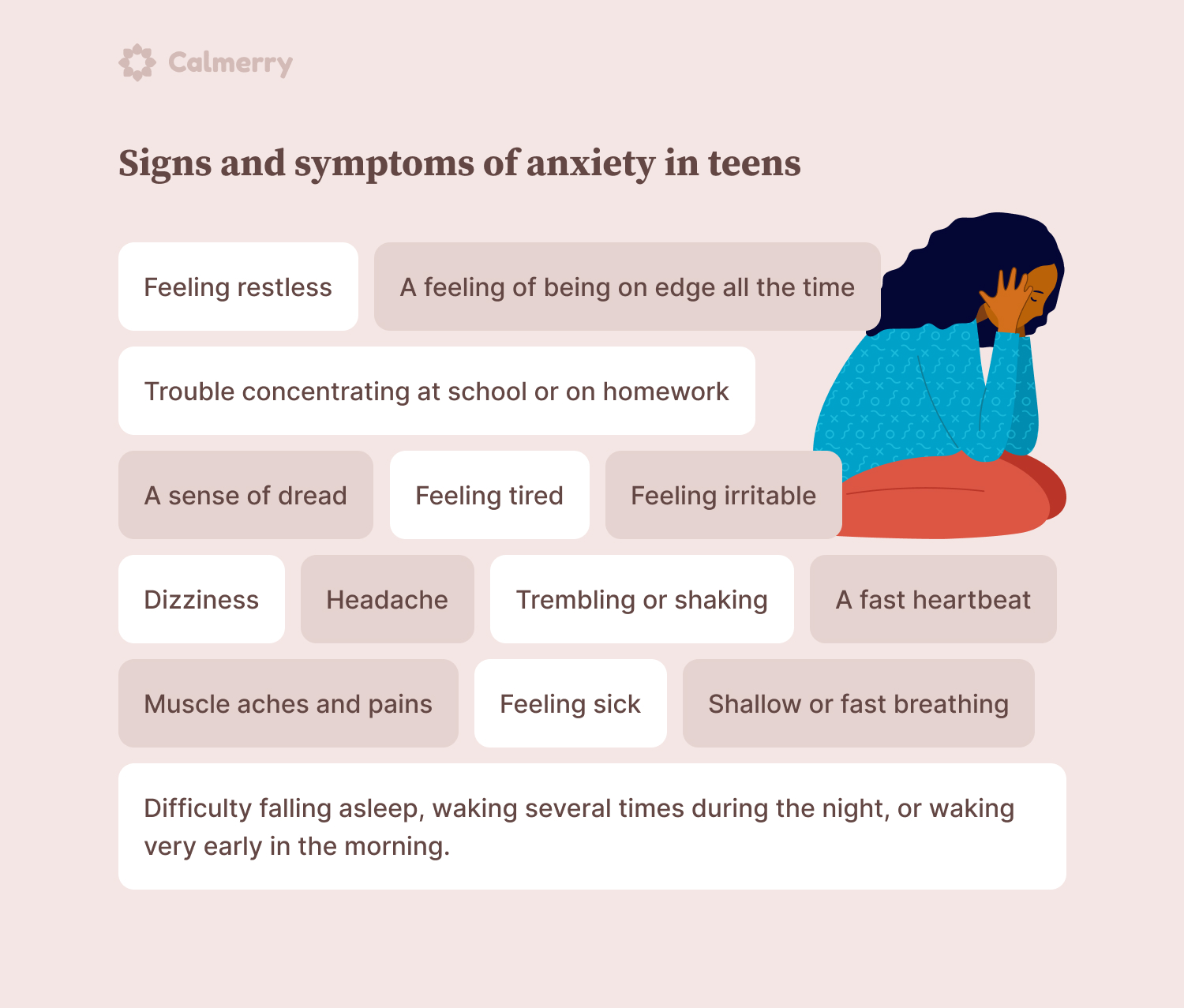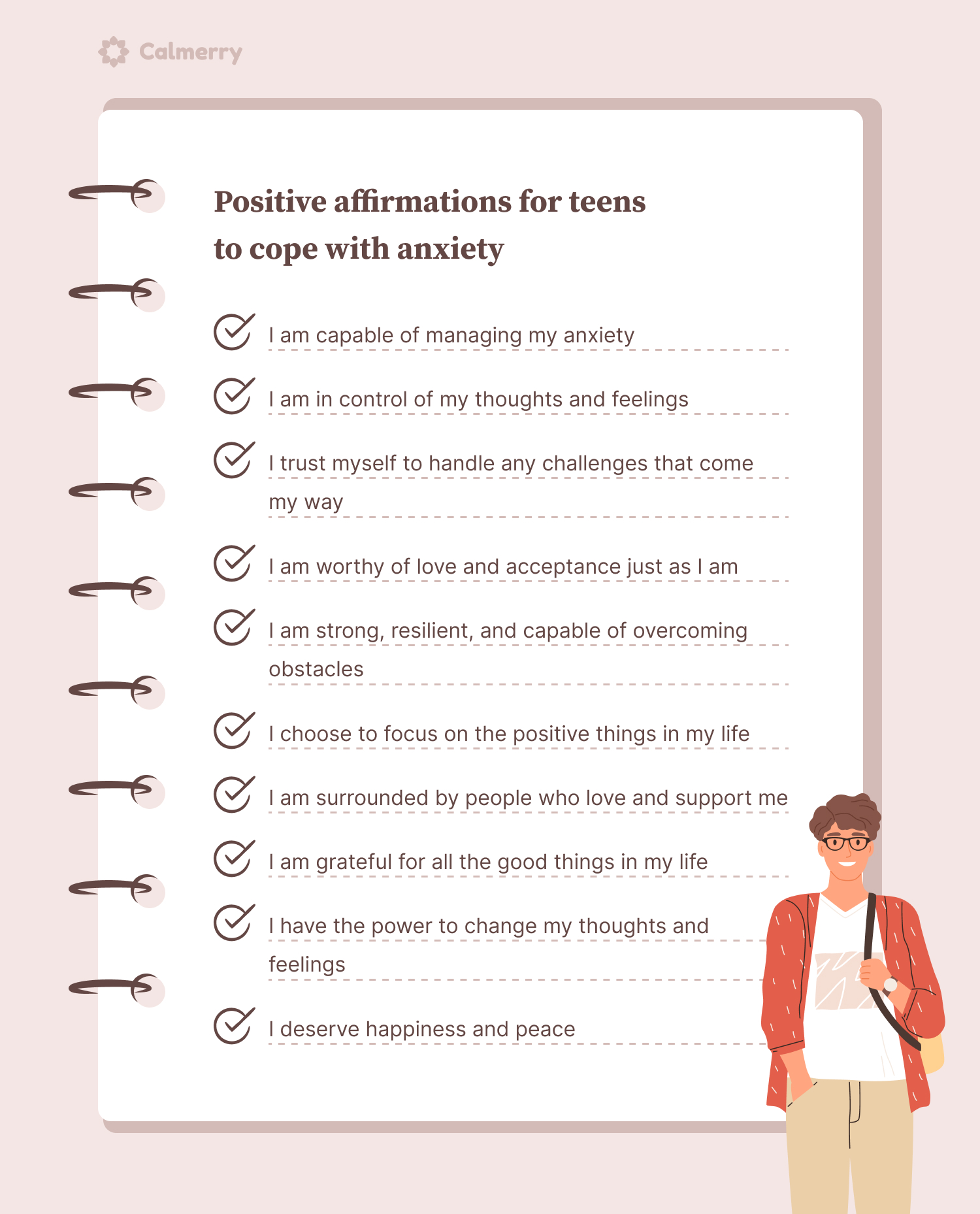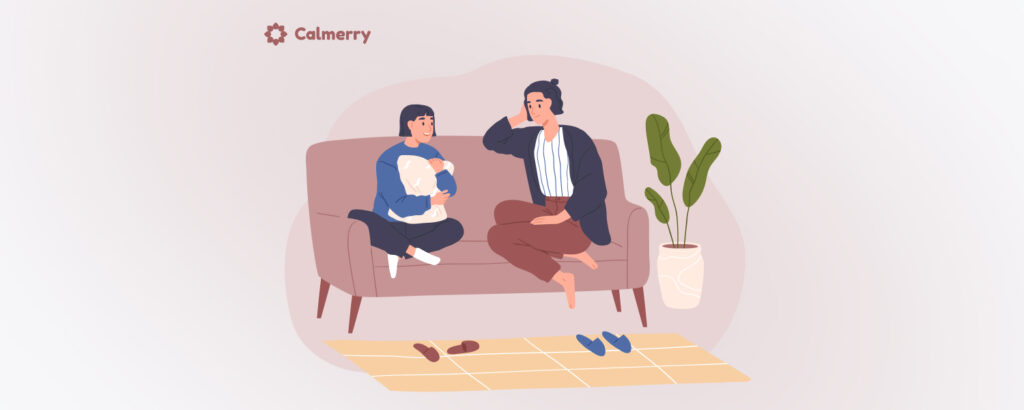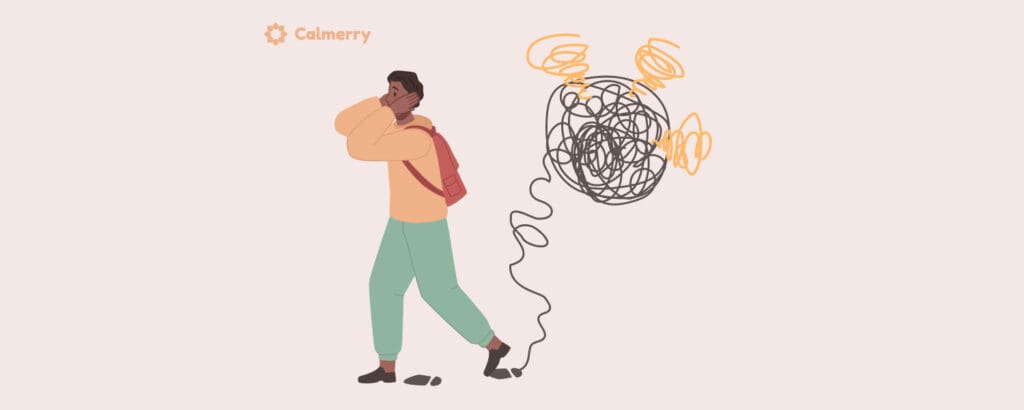Anxiety in Teens: How Can You Help as a Parent?

In this article
Anxiety disorders are the most common mental disorders in the US. Generalized Anxiety Disorder (GAD) affects around 18% of the population, equivalent to 40 million adults.
However, it is becoming increasingly better understood that it is not just adults who are affected by anxiety. Anxiety in teenagers and younger children can commonly occur, with a staggering 31.9% of teenagers aged 13-18 in the US having an anxiety disorder.
Anxiety disorders can affect an adolescent’s enjoyment and quality of life. In this article, we will look at the signs of anxiety in teens, as well as ways to support the younger generation with anxiety.
Understanding anxiety in teens
Anxiety is an umbrella term that covers several different forms of anxiety. Generalized anxiety disorder, social anxiety, anxiety with depression, panic disorders, and agoraphobia are all forms of anxiety.
It is normal to feel anxious or fearful at times of stress. Exams, public speaking, friendship difficulties, and worries about family or money can all cause anxiety for teenagers. During these times, the brain enters a heightened state known as “fight or flight” to make us more alert to the situation.
Fight or flight is a biological response that prepares us to manage dangerous situations. Our heart rate increases, we become more focused, and the body puts more energy into managing the situation. This is beneficial during a stressful period, as it helps us to focus on preparing for an exam or a big event. This form of anxiety is a normal, healthy part of life.
Once the stressful situation is over, anxiety should resolve. However, if the event has passed and a teenager is still feeling stressed or has feelings of panic, this could signal the presence of an anxiety disorder.
More on anxiety statistics in teens
Teenage anxiety statistics from the National Comorbidity Survey Adolescent Supplement (NCS-A) show that almost a third of adolescents aged 13 to 18 in the US have a form of anxiety disorder. Based on the diagnostic criteria of mental disorders, over 8% of these teenagers had anxiety that caused severe impairment.
Anxiety in teen girls is more common than in boys. About 38% of adolescent females are affected by an anxiety disorder, compared to 26% of adolescent males.
Anxiety can occur at any time between the ages of 13 and 18, with a similar prevalence across the teenage years.
Signs and symptoms of anxiety in teens
Generalized anxiety can lead to the following symptoms and signs:
- Feeling restless
- A feeling of being on edge all the time
- Trouble concentrating at school or on homework
- Feeling irritable
- A sense of dread
- Emotional and physical exhaustion
Because anxiety can put the body into a fight or flight response, the symptoms in teens can also manifest as physical complaints. The symptoms might include:
- Dizziness
- Feeling tired
- A fast heartbeat
- Shallow or fast breathing
- Trembling or shaking
- Muscle aches and pains
- Headache
- Feeling sick
- Difficulty falling asleep, waking several times during the night, or waking very early in the morning.
Sometimes, teenagers can become concerned that the physical symptoms are caused by a sinister medical condition or disease, leading to further anxiety.
As anxiety worsens, teenagers may become withdrawn, avoiding school or social activities that were previously enjoyed. You may also notice that their grades are dropping, or that they appear to have difficulty concentrating on chores or homework.
Physical complaints, including feeling tired, having aches and pains, and behavioral changes, such as irritability, can incorrectly be assumed to be due to “teenage hormones.” But may, in fact, be related to underlying anxiety.
As a parent, it is important to be able to recognize the signs and forms that anxiety can take so that you can support your child.

Types of anxiety in teens
Just as there are different types of anxiety in adulthood, anxiety in teens can present in a range of anxiety disorders.
Generalized anxiety disorder (GAD)
Generalized anxiety disorder, or GAD, is characterized by persistent worrying about several everyday events or issues. This might include being overly concerned about family, friendships, school, or sporting activities.
From the outside, it can seem like a teenager is worrying excessively about things that may never happen or are unlikely to cause an issue anyway.
As a parent, it can seem that the worry is unwarranted and blown out of proportion. However, for the teenager, the feelings of anxiety are real and can feel difficult to overcome.
Anxiety with depression
Sadly, it is common for anxiety to be linked with depression. Stressful life events are known to be linked to the emergence of anxiety and depression in teens.
Alongside the symptoms of anxiety, a teenager may also experience:
- Constantly low mood
- Negative thoughts
- Feelings of hopelessness
- Anhedonia
- Changes in appetite or sleep patterns
- Or even thoughts about harming themselves
Panic disorder
Panic disorders are a form of anxiety. Although feelings of panic may occur when facing a stressful situation, such as just before public speaking or taking part in a race, sometimes an acute episode of panic can occur for no apparent reason.
A panic attack is a severe manifestation of anxiety. Teenagers may experience:
- A racing heartbeat
- Feeling faint or dizzy
- Feeling sick or having a churning stomach
- Breathlessness
- Chest pain
- Shaking or trembling
- Dry mouth
- Ringing in the ears
- A feeling of impending doom or death
A panic attack might last for 5 minutes or more. Although they feel very scary, they are not dangerous. It can be helpful to remind a teenager of this, both when they are free from panic and during a panic attack. Remembering that a panic attack cannot cause harm to a teen can be reassuring.
Social anxiety
Social anxiety is sometimes known as social phobia, and it commonly starts during adolescence. It is characterized by a fear of social situations. Social anxiety in teens is common, and for many people, it will improve as they get older.
Social anxiety can affect all aspects of teen life, including school, sports, friendships, and hobbies. Although we might all feel nervous about a social situation, social anxiety causes excessive worrying that may prevent someone from going to an event.
Parents or teachers may notice that a previously confident teenager starts to miss school, no longer volunteers for tasks, or fails to sign up for clubs. Teenagers may also spend less time with their friends and may avoid leaving the house.
Agoraphobia
Agoraphobia is a fear of being in situations where it might be difficult to leave or escape. Fears might include going to the movies, traveling on a train, or going to a shopping mall. Some people can become fearful of leaving the house.
In agoraphobia, stressful situations can lead to feelings of panic. Teenagers with agoraphobia may arrange only to socialize in their own home, prefer to order clothing online for delivery, and may decline invitations to social events.
The fear of being unable to leave and the subsequent panic can prevent teenagers from doing the activities they previously enjoyed.
Separation anxiety
Separation anxiety is a type of anxiety that can affect people of all ages, including teenagers. It is characterized by excessive worry or fear about being separated from a person or place that provides a sense of security, such as a parent or home.
In adolescence, separation anxiety can manifest as reluctance or refusal to attend school, sleepovers, or social events without a parent or caregiver present.
Teens with separation anxiety may also experience physical symptoms such as headaches, stomachaches, or nausea when faced with separation from their comfort zone.
What causes anxiety in teens
Anxiety in teens is common, yet in 2020, Newport Academy reported that anxiety in children and teenagers is still increasing. Diagnosis of anxiety disorders in children aged six to 17 increased by 20% between 2007 and 2012.
Older teens are also seeing an increase in anxiety. Between 1985 and 2016, the percentage of 18- and 19-year-old students at UCLA who reported feeling “overwhelmed by all they had to do” increased from 18% to almost 41%.
Although the exact cause of this all-time high in anxiety isn’t fully understood, experts have formulated several theories.
High-pressure childhoods
Today, teenagers are under extreme pressure to be successful. Even early in high school, children are expected to start considering college options, career pathways, and how they can combine academic aptitude with extracurricular achievements to secure their future.
Competition within the class can be intense, with not only internalized pressure from the teenager, but high expectations of their parents, friends, teachers, and the wider community, too. Fear of failing or being a disappointment can quickly connect teens and anxiety.
Access to negative news
Many teenagers have smartphones, giving them 24/7 access to news outlets and social media. Teenagers are instantly exposed to negative news, including reports on natural disasters, crime reports, and terrorism.
This can make it harder to feel safe, increasing anxious thought patterns.
Social media
Although social media can be a great tool for connecting teenagers, it can sadly have a negative effect on mood and well-being.
This is particularly true in adolescent girls. Researchers found that girls who used social media were vulnerable to:
- Inadequate sleep due to scrolling through social media feeds late into the night
- Cyberbullying
- Reduction in physical activity and exercise due to more time being prioritized for social media
- Social comparison and lower self-esteem
It was recommended that interventions were required in all three areas to protect the mental health of teenagers.
How to help teens with anxiety as a parent
If you recognize these symptoms and signs of anxiety in yourself or your child, there are several steps in helping teens with anxiety.
Recognize the symptoms
The first step in helping your teenager is to recognize that their symptoms might be related to anxiety.
We have already seen that anxiety can be wrongly labeled as a normal part of the teenage years. However, if the symptoms are affecting daily life and limiting what a teenager feels able to do or enjoy, it is important to take steps to manage anxiety.
Helping your child see that their symptoms could be related to anxiety can be reassuring for them. Understanding that the unpleasant feelings of chronic worrying, headaches, and poor sleep are caused by an exaggerated response to stress may alleviate some of their worries.
Once your teenager can see the root of their symptoms, they can start to deal with them.
Take the pressure off
Teenagers are already under immense pressure. Although it is natural to want your teenager to do well at school and in life in general, having high or unrealistic expectations of your child can increase the risk of them becoming anxious.
Support your child without pressuring them, and be mindful of your own expectations. If appropriate, remind them that their happiness is your priority and your love is unconditional.
Talk about social media
There’s a high chance that your child already uses social media. Having open and honest discussions about the link with anxiety and steps that you and your teenager can take to limit the risk of ill health due to excessive phone use can be helpful.
Recommend using affirmations

Help your child write positive affirmations. These affirmations will vary depending on the root of their anxiety. But internally repeating statements such as “I am loved” or “I always try my best” throughout the day can be one of the most effective coping skills for teen anxiety.
Here are some other affirmations that can be helpful for teenagers with anxiety:
- I am capable of managing my anxiety
- I am in control of my thoughts and feelings
- I trust myself to handle any challenges that come my way
- I am worthy of love and acceptance, just as I am
- I am strong, resilient, and capable of overcoming obstacles
- I choose to focus on the positive things in my life
- I am surrounded by people who love and support me
- I am grateful for all the good things in my life
- I have the power to change my thoughts and feelings
- I deserve happiness and peace
Encouraging teenagers to repeat these affirmations daily can help them to cultivate a more positive and confident mindset, reduce feelings of anxiety, and promote greater resilience in the face of challenges.
Get professional help
Many parents will be in a similar position to you. If severe anxiety is starting to have a negative impact on your teen, it is wise to seek help. Visit your family doctor, speak to your child’s school, or arrange for some therapy sessions for your child.
Techniques, including cognitive behavioral therapy (CBT) and other talking therapies for anxiety, can be beneficial in breaking the patterns of anxious thoughts.
Remember to take care of your own mental health, too, and ask for help if you need it. If you need professional support for your mental well-being as a parent or some parenting guidance, online therapy on Calmerry can be a good option for you.
Try some calming apps
Anxiety and mindfulness apps are helpful tools for understanding and managing the symptoms of anxiety and panic.
Factually correct information, guided meditations, and calming activities may all provide a safe outlet for your child’s thoughts and fears.
Final thoughts
Anxiety in teenagers is common and rising. The symptoms can be scary and overwhelming, but they are not dangerous to a teenager’s physical health. However, anxiety is extremely unpleasant and can affect a child’s quality of life.
Understanding the symptoms and types of anxiety can help you to support your teenager better. Empower them to take charge of their mental health by supporting them wholeheartedly, removing external pressure where possible, and arranging for specialist support when needed.
If you need to talk to someone professional about your mental health as a parent, Calmerry therapists are here to support you.
online therapy
live video session




